ISSN 2768-4261 (Online)

A Journal of Tibetan Literature, Arts and Humanities
A Network of Kindred Souls: Pema Tseden as Producer and Art Director
Brigitte Duzan
Abstract: Pema Tseden was mostly known in the West as a film director and as a writer. But starting from 2015, when Tharlo attracted worldwide attention, he also played an important part that has gone mostly unnoticed until now: that of producer and art director not only for aspiring Tibetan filmmakers, but also for young Han Chinese directors. This paper traces the trajectory of Pema Tseden’s contributions towards renewing the Chinese ‘cinema d’auteur,’ ushering in new aesthetics and themes largely ignored in more mainstream Chinese cinema.
Keywords: Pema Tseden, film producer, art director, Chinese cinema, Tibetan cinema
When Pema Tseden’s short but intense career is discussed, he is most often referred to as a groundbreaking filmmaker who created a space for Tibetan films in the People’s Republic of China, and as a bilingual writer and translator. But there is a part of his wide array of activities that seldom receives attention, at least in the Western world: that of a producer and/or art director not only of aspiring Tibetan filmmakers but also of other emerging non-mainstream Chinese directors. In this way, he has exerted an increasing influence on a specific portion of Chinese contemporary cinema, a cinema that would have been dubbed ‘independent’ some ten years ago, but nowadays would better be defined as ‘cinema d’auteur’ – in other words, cinema as art, not ‘industry.’ This means a cinema that longs for the best achievements in terms of aesthetics, and not necessarily in terms of box office. As a result, it is a cinema that survives in China at the margin of the official system, in especially difficult conditions in view of screening opportunities, still more than censorship. In the last eight years of his life, and in parallel to his own and busy career as a filmmaker, Pema Tseden gradually appeared as a mentor of this young and sophisticated cinema d’auteur on Chinese soil.
2015: Landmark Year
Pema Tseden’s activities in the field of film production started in 2015, the very year Tharlo (ཐར་ལོ།) was selected and screened at the Venice Film Festival. In that sense, Tharlo appears as a real turning point in Pema Tseden’s career: not only because that film represents a new departure in his own cinematography, but also because it marks a starting point in his recognition as a transnational artist, thanks to his own films, but also thanks to the films he helped to conceive and produce.
He started with the films made by Sonthar Gyal (ཟོན་ཐར་རྒྱལ།), initially his director of photography.[1] He had been the art director of Sonthar Gyal’s first film, The Sun Beaten Path (དབུས་ལམ་གྱི་ཉི་མ།), released in March 2011, but in 2015 endorsed the role of a producer, since he coproduced Sonthar Gyal’s second film, River (གཙང་པོ།), which was in competition at the Berlin Film Festival in February 2015.
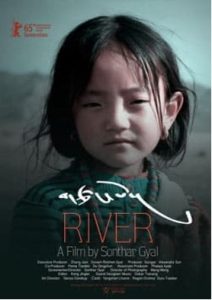
Poster of the film River
Later, in 2020, Pema Tseden worked as the executive producer of Dukar Tserang’s (གདུགས་དཀར་ཚེ་རིང་།) first film: A Song for You (ཁོ་དང་བློ་ཡི་གཏེར།)—a film coproduced among others by Xstream Pictures, Jia Zhangke’s production company. [2]
By this time, Pema Tseden had developed as a producer and art director and had already become an advisor to young promising Chinese filmmakers, most often helping them make their first films, as we will now turn to see.
2016-2017: Mentor of Young Filmmakers
Pema Tseden was one of the executive producers of the first feature film made by ): Knife in the Clear Water (《清水里的刀子》), released in October 2016 at the Busan Film Festival (South Korea), where it was awarded the first prize (ex aequo) in the New Currents section. It is worth noting that Wang Xuebo had himself been one of the producers of Tharlo.
Knife in the Clear Water was adapted from a short story of the same title by Shi Shuqing (石舒清), a Hui writer from the Northwestern province of Ningxia whose stories reflect his Muslim culture. The particular story chosen by Wang Xuebo is that of an old man who has lost his wife; to celebrate her death’s anniversary, his son wants him to sacrifice the old ox which has been his life companion. The film is a series of austere still-life pictures as a kind of mirror of the old man’s simple life and environment. It reflects, in subdued colors, the local culture and way of life which are gradually disappearing, and in that sense can be considered similar to Pema’s films, in content and form.
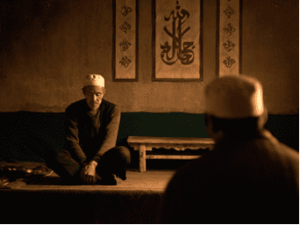
A still of father and son from the film Knife in the Clear Water
In July of that same year 2016, Zhang Dalei (张大磊)’s first film, The Summer is Gone (《八月》), was in competition at the Xining FIRST Film Festival.[3] Zhang Dalei’s film was awarded a double prize at the Golden Horse Film Festival in Taipei in November and was selected at the Berlin Film Festival in February 2017. Pema was the executive producer of this film, and more than that: it is a black-and-white film and can thus be considered as one of the many films inspired by Tharlo. The Summer is Gone has the aesthetic feel of a souvenir album or a scrapbook of pictures of the last summer of a boy’s childhood.

A still depicting the last stroll of the summer in The Summer is Gone
The cinematographer of Zhang Dalei’s film was none other than Lü Songye (廖庆松), that is, the director of photography who had just filmed Tharlo. But, in The Summer is Gone, the black-and-white is different, with various tints and shades: it has a sepia tinge to allude to the memory of the 1990s, a greyish hue like mist for daily remembrances, and even expressionist tones for night scenes. The actors are non-professional, which gives a further impression of being close to Pema Tseden’s film universe.[4]
Pema Tseden then helped produce a Tibetan documentary: Daughter of the Light (འོད་ཀྱི་བུ་མོ།,《光之子》), second documentary of Khashem Gyal (མཁའ་བྱམས་རྒྱལ།,卡先加).[5] This Daughter of the Light is a young 13-year-old Tibetan girl whose parents are divorced and have remarried; she lives in an orphanage, spends her holidays with her grand-parents, but since she has hardly ever seen her father, she decides to go and look for him. The film was awarded the Colors of Asia prize at the Tokyo Docs festival in 2017.
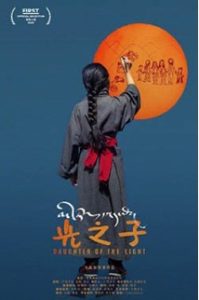
Poster of the film Daughter of the Light
Khashem Gyal made another documentary about the same little girl, which was in competition at the Xining FIRST Film Festival in 2019. Meanwhile Pema Tseden made Jinpa (ལག་དམར།, 《撞死了一只羊》) and Balloon (དབུགས་ལྒང་།, 《气球》), which were released respectively in 2018 and 2019, both at the Venice Film Festival.

Khashem Gyal (left) in the office of Osong Media (the company he created with his two partners in Xining), August 2019, ©Françoise Robin
Pema Tseden went back to production thereafter, as executive producer of two quite exceptional first films by Chinese directors released in 2020, in addition to Dukar Tserang’s own film.
2020: Executive Producer of Two Chinese Films
The Land in the River (《河洲》) was the first film of a young filmmaker, Zeng Jiangui (曾建贵), born in 1992. The film has been selected by the Film Lab of the FIRST Film Festival of Xining in July 2020, and then in September of the same year, was awarded a Creative Award in the Venture Capital section of the 4th Pingyao Film Festival.
The title of the film refers to the name of the district of the Gansu province where Zeng Jiangui was born: the autonomous Dongxiang district (甘肃东乡族自治县) which is the home of the Dongxiang people, one of the fifty-six official ethnic groups of China and, according to official statistics, one of the poorest and least literate. This film is the first one to depict a group of women and children from this ethnic group, with all the dialogues in their specific language, which belongs to the family of the Mongolic languages.[6] As such, this film was intended and conceived as a way to defend and promote the Dongxiang people’s culture and language. In this way, Pema Tseden’s role as executive producer of The Land in the River appears as a move to help defend a minority culture and language threatened by the dominant culture and language in contemporary China, in an approach similar to his defense, in his own films, of the Tibetan culture and language.
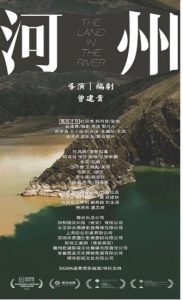
Poster of the film The Land in the River
Damp Season (《回南天》), which Pema Tseden produced that year too, was the first feature film of another young Chinese filmmaker: Gao Ming (高鸣). The idea was here to help a young beginner. The film was produced by Factory Gate, a production company created by veteran film lovers in 2017 which has also produced Balloon. It is to be noted that the executive producer of Damp Season was Geng Jun (耿军), a very subtle filmmaker who is noted for his specific type of humour noir. In 2016, Geng Jun was also the executive producer of the film made by Wang Xuebo. They all appear as a kind of artistic family, related by similar aesthetic objectives and criteria.

Poster of the film Damp Season
2021: Four Productions
In 2021, Pema Tseden had diversified his production activities, starting with another debut film by a Tibetan filmmaker, Loden (བློ་བསྟན།, 洛旦): Lost (དགུན་ལམ་རིང་མོ།,《迷路》), released in April that year.[7] Pema was the producer of this film, and it was coproduced by Mani Stone Pictures, the production company that was created for Balloon. The story of Lost– two shepherd families fighting to save their herds of yaks from a snowstorm– is typical of Pema’s film universe and is also a black-and-white film. It was presented at the Hong Kong Film Festival as a “breathless survival thriller and heartbreaking eulogy to a disappearing way of life.”[8]

Loden in his motel during the shooting of Lhapal Gyal’s The Great Distance Delivers Crane, Amdo, August 2019, ©Françoise Robin
Loden had played a small part in Balloon, that of a rickshaw driver who takes the nun to see her relatives during a summer break. He was also involved in the shooting of The Great Distance Delivers Crane by Lhapal Gyal (on which see below), Pema Tseden’s assistant, as he rented out his motel to the crew for the duration of the shooting.
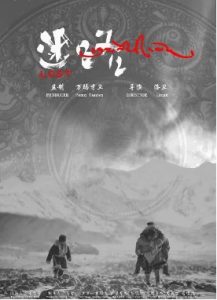
Poster of the film Lost
The three other films produced that year with Pema’s help are films by young Chinese directors. First, he was the executive producer of One Man Funeral (《一个人的葬礼》), first feature film by Chao Fan (超凡), born in 1992. One Man Funeral was released at Xining FIRST Film Festival in July 2021. The main character in the film is a forest ranger, who, while patrolling the forest, prepares the funeral of his recently deceased father, meticulously following the precise stages of the ancient rituals. Pema’s influence can be felt in the demanding and original aesthetics of the film: it is not only a black-and-white film but also without dialogues, a purely meditative film.
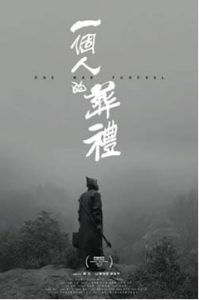
Poster of the film One Man Funeral
Before his first feature film, Chao Fan had previously made a short film called Cattle (《牲口》) which might as well be one of Pema’s stories: an old man has a donkey and a son; the son is studying and borrows money to buy a computer. Years later, the lender wants his money back, so the old man offers his donkey, but he is told the donkey is so old that it can only be given away to the slaughterhouse.
Beyond the Skies (《云霄之上》) by Liu Zhihai (刘智海) is the second Chinese film released in 2021 where the name of Pema Tseden appears in the end credits as producer. This is at first amazing since it appears to be a war movie, not the type of film you would normally associate with Pema Tseden: the story takes place during the war against Japan, as a small group of soldiers of the Chinese army has been ordered to go and blow up an ammunition depot of the enemy within forty-eight hours. The film has been screened in the main official Chinese film festivals, the Shanghai Film Festival in June, and the Beijing International Film Festival in September. But Beyond the Sky is no ordinary mainstream Chinese-style war movie; it is a low-budget film that does not even qualify to be a real war movie. The author of the script is a female scriptwriter, Zhou Jiali (周佳鹂), who wrote a Ph.D. thesis on Deleuze.
Liu Zhihai, for his part, claims a “poetical aesthetics” in his filmmaking: the conflict between desire to live and sense of duty, but as a meditation between real and surreal, and again in black-and-white, with images of pure beauty as in a Chinese landscape painting. Pema Tseden was not only a producer but has also been the advisor for the film’s visual aspects. And again, as in any film by Pema Tseden, every detail of Beyond the Skies has been carefully planned, including the dialogues in the local dialects spoken where the story unfolds (Hunan, Hubei, Southwest of Zhejiang). Liu Zhihai has proposed to call his film a “literary war movie.”
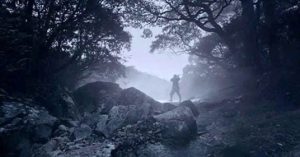
Still of the film Beyond the Skies
Among the films coproduced by Pema Tseden which were released in 2021 must also be mentioned the first feature film made by his son Jigme Trinley (འཇིགས་མེད་འཕྲིན་ལས།): One and Four (མི་གཅིག་དང་མི་བཞི།,《一个和四个》) was presented at the Tokyo Film Festival in November, and was then in competition in Xining FIRST Film Festival in July 2022. The four characters in the film are played by his father’s recurring actors, including Jinpa (སྦྱིན་པ།); and the cinematographer is Lü Songye, who was also the director of photography for Tharlo. The film is a terse huis-clos which is more or less in line with the present trend in China’s cinema, especially among the filmmakers formed at the Beijing Film Academy like Jigme himself. It can be considered as a sub-genre of the present Chinese film noir, with technical aspects perfected under his father’s advice.

Poster of the film One and Four
Jigme Trinley’s debut film can also be considered a sort of experimental trial in terms of production. From then on, Pema Tseden’s activities have been oriented more specifically towards films made by young emerging Tibetan directors.
2022: Support of Tibetan Directors
Pema Tseden was the art director of Kong and Jigme (ལོ་ཁུང་དང་འཇིགས་མེད།,《回西藏》), a film codirected by Chen Guoxing (陈国星) and Lhapal Gyal (ལྷ་དཔལ་རྒྱལ།,་拉华加), the latter one known for his excellent debut feature, Wangdrak’s Rain Boots (ཆུ་ལྷམ་ཆུང་ཆུང་།,་旺扎的雨靴), selected at the Berlin Film Festival in 2018. Kong and Jigme tells the story of a Chinese who went to Tibet to work and his Tibetan ‘translator’-turned-friend (the script is based on a true story). Two of the actors, Jinpa and the actress Sonam Wangmo (བསོད་ནམས་དབང་མོ།), are familiar faces. Lhapal Gyal has himself served as Pema’s assistant for Tharlo and Balloon as well as executive director of Knife in a Clean Water.
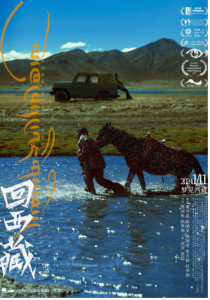
Poster of the film Kong and Jigme
Pema Tseden was again the executive producer of the next film made by Lhapal Gyal: “The Great Distance Delivers Crane” (《千里送鹤》), released in Xining in July 2022.

Pema Tseden and Lhapal Gyal during the shooting of The Great Distance Delivers Crane on the shores of the Kokonor Lake. August 2019 ©Françoise Robin
At the same time, Pema Tseden had developed close relationships with the small production studios which appeared in China in the 2010s and operated like film incubators outside the official circuits (but entirely ‘above ground’), cinema greenhouses like Heaven Pictures which coproduced Tharlo, or Factory Gate which coproduced Balloon as well as Zhang Dalei’s second film. One should of course make a special mention of Garuda Films, launched in September 2016 by Sonthar Gyal in Badzong (ch. Tongde, Qinghai Province).[9]
Pema Tseden had thus gradually established a network of interconnected, wide-ranging relationships, which contributed to his authority as an influential filmmaker beyond the scope of Tibetan cinema per se; and in return, this authority and these ties helped him find the means to produce his own films. As time went by, Pema Tseden’s image as a producer emerged as a complement of his image as a director: the image of a filmmaker determined to promote Chinese as well as Tibetan films, based on the same fundamental quality requirements, with a focus on Tibetan films in the last year of his terribly brief career, as if suddenly came to life the Tibetan films he had been working all along to support and promote.
Works cited
Lefort, Julie. “New Linguistic Practices in Dongxiang: Moving toward the Categorization of Youth Language?” Langage et société, vol. 141, no. 3, 2012, pp 71-98.
Robin, Françoise. “Poem: ‘This is How We Quietly Work’ By Gangshun with Accompanying Essay. https://highpeakspureearth.com/poem-this-is-how-we-quietly-work-by-gangshun-with-accompanying-essay-by-francoise-robin/
Robin, Françoise. “Regards Comparés: Tibet”. Jean Rouch Festival, 26-29 Nov. 2012, https://www.comitedufilmethnographique.com/
Shi, Shuqing. A Knife in Clear Water and Other Stories. Long River Press, 2011.
Tsui, Clarence. “‘The Summer is Gone’ (‘Ba Yue’): Film Review.” The Hollywood Reporter, July 29, 2016.
Films cited
Chao, Fan, director. Cattle, 2016.
—, director. One Man Funeral, 2021.
Chen, Guoxing and Lhapal Gyal, directors. Kong and Jigme [Khong dang ’jigs med], 2022.
Dukar Tserang, director. A Song for You [Kho dang blo yi gter], 2020.
Gao, Ming, director. Damp Season, 2020.
Jigme Trinley, director. One and Four [Bzhi dang gcig], 2021.
Khashem Gyal, director. Daughter of the Light [’Od kyi bu mo], 2020.
Lhapal Gyal, director. The Great Distance Delivers Crane, 2022.
—, director. Wangdrak’s Rain Boots [Chu lham chung chung], 2018.
Liu, Zhihai, director. Beyond the Skies, 2021.
Loden, director. Lost [Dgun lam ring mo], forthcoming.
Pema Tseden, director. Balloon [dbugs lgang], 2019.
—, director. Jinpa [Sbyin pa], 2018.
—, director. Old Dog. [Khyi rgan], 2011.
—, director. The Search [’Tshol], 2009.
—, director. Silent Holy Stones [Lhing ’jags kyi ma Ni rdo ’bum], 2005.
—, director. Tharlo [Thar lo], 2015.
Sonthar Gyal, director. River [Gtsang po], 2015.
—, director. The Sun Beaten Path [Dbus lam gyi nyi ma], 2011.
Wang, Xuebo, director. Knife in the Clear Water, 2016.
Zeng, Jiangui, director. The Land in the River, 2020.
Zhang Dalei, director. The Summer is Gone, 2016.
Notes
[1] Sonthar Gyal was the director of photography for Pema Tseden’s The Silent Holy Stones (ལྷིང་འཇགས་ཀྱི་མ་ཎི་རྡོ་འབུམ།) (2005), The Search (འཚོལ།) (2009), and Old Dog (ཁྱི་རྒན།) (2011). In 2011, he started his own career as director.
[2] Dukar Tserang was Pema Tseden’s sound director; he teamed up with Sonthar Gyal and worked with him for Pema Tseden’s first feature films as mentioned above but continued to work on the sound of Tharlo (2015) and Jinpa (2018).
[3] That festival is located in the capital city of Qinghai province, on the fringes of the Amdo Tibetan region. It is the last survivor of the festivals of Chinese ‘independent’ cinema of the past and has become over the years one of the most important promoter of young filmmakers in China.
[4] See Clarence Tsui’s review, see https://www.hollywoodreporter.com/movies/movie-reviews/summer-is-gone-ba-yue-914912/
[5] Khashem Gyal is one of the first Tibetan documentary filmmakers. See introduction by Françoise Robin for the Jean Rouch festival: https://www.comitedufilmethnographique.com/texte-de-presentation-de-francoise-robin-introductory-text-by-francoise-robin/
[6] See https://www.cairn-int.info/article-E_LS_141_0071–new-linguistic-practices-in-dongxiang.htm#:~:text=The%20Dongxiang%20language%20is%20regarded,Field%201997%3B%20Bao%202008).
[7] That initial version was redone on Pema Tseden’s advice, which shows that his role extended far beyond that of producer in the stricter sense of the term. In August 2023, that second version was still in postproduction stage (personal communication from Françoise Robin, 15 April 2024, after a conversation she had with Loden in August 2023 in Xining).
[8] Françoise Robin, personal communication, September 2023.
[9] For a short overview of Garuda Films, see https://highpeakspureearth.com/poem-this-is-how-we-quietly-work-by-gangshun-with-accompanying-essay-by-francoise-robin/
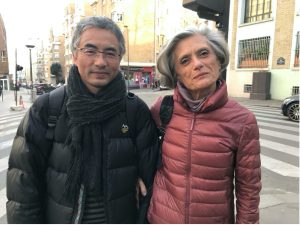
Pema Tseden and Brigitte Duzan, Paris, February 2019 ©Françoise Robin
Brigitte Duzan is a French sinologist, independent researcher, and translator. Her recently published translations include Funérailles molles (《软埋》) by Fang Fang (L’Asiathèque, 2019). In 2021, she created a collection of Chinese novellas with the same publisher. She is the translator of Pema Tseden’s Chinese-language short stories (Neige, Philippe Picquier 2013, J’ai écrasé un mouton, Picquier 2022) and has subtitled the Chinese dialogues of Tharlo. With Katia Buffetrille, she has also translated Tsering Woeser’s poems Amnye Machen, Amnye Machen (《阿尼瑪卿. 阿尼瑪卿》Jentayu, 2023). She is the founder and developer of two reference websites on Chinese literature and cinema: http://www.chinese-shortstories.com/ and http://www.chinesemovies.com.fr/
© 2021 Yeshe | A Journal of Tibetan Literature, Arts and Humanities